河南省驻马店市2024-2025学年高二下学期期末质量监测英语试卷 ( PDF版含答案,无听力音频含听力原文)
文档属性
| 名称 | 河南省驻马店市2024-2025学年高二下学期期末质量监测英语试卷 ( PDF版含答案,无听力音频含听力原文) | 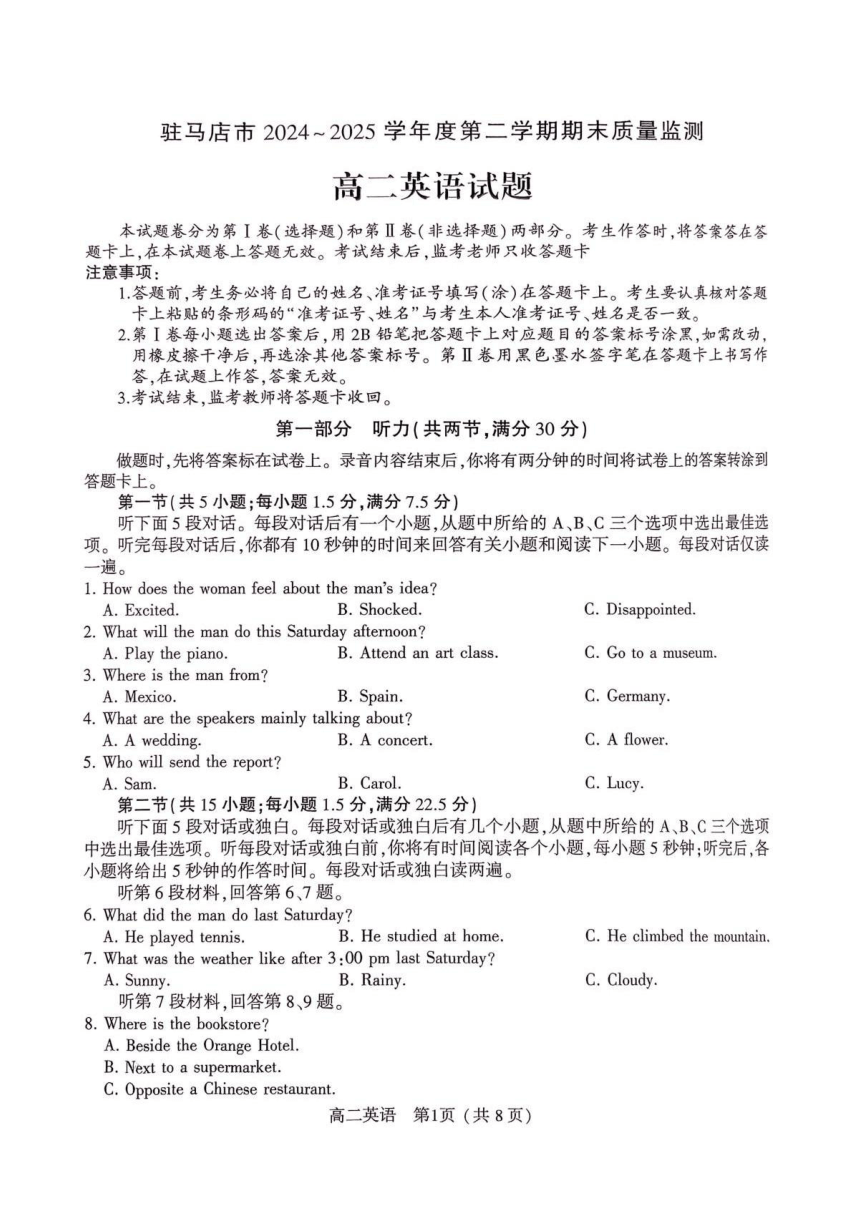 | |
| 格式 | docx | ||
| 文件大小 | 4.5MB | ||
| 资源类型 | 教案 | ||
| 版本资源 | 通用版 | ||
| 科目 | 英语 | ||
| 更新时间 | 2025-07-20 11:18:54 | ||
图片预览

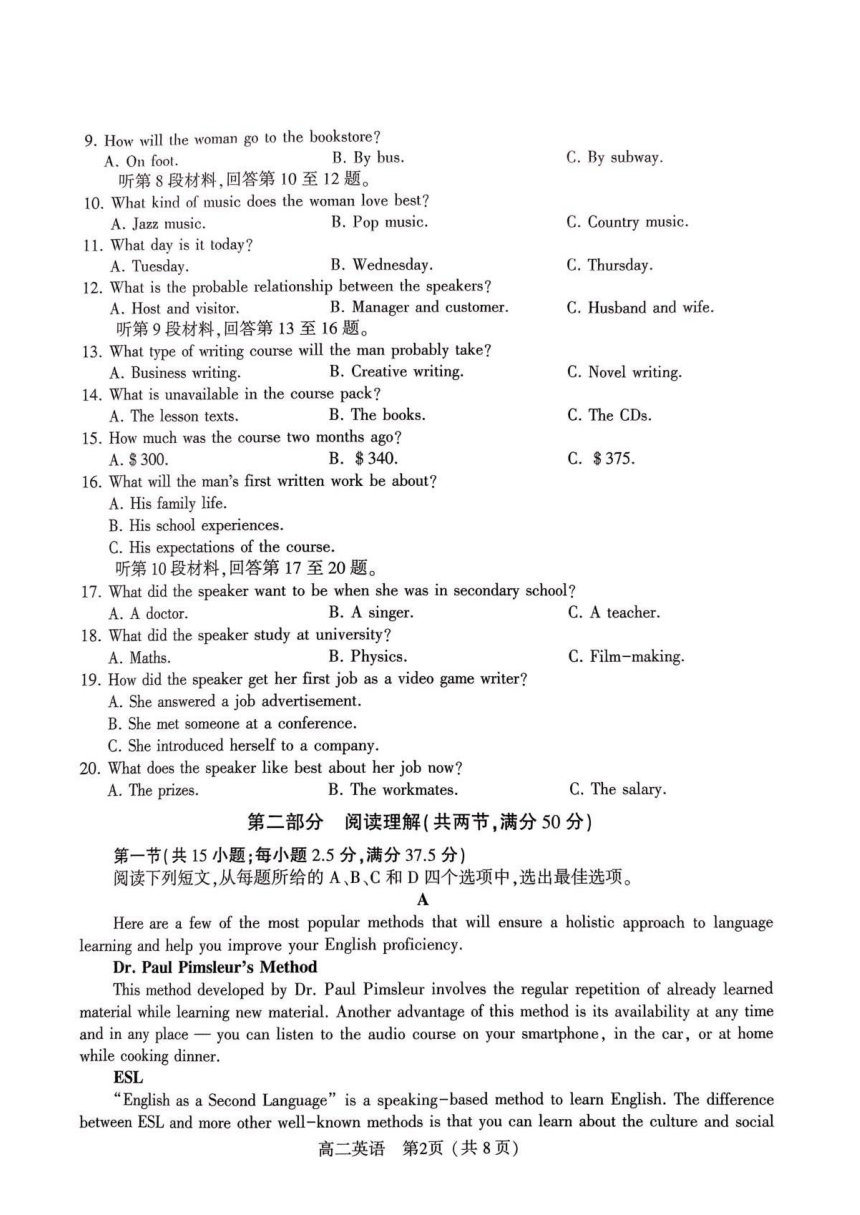
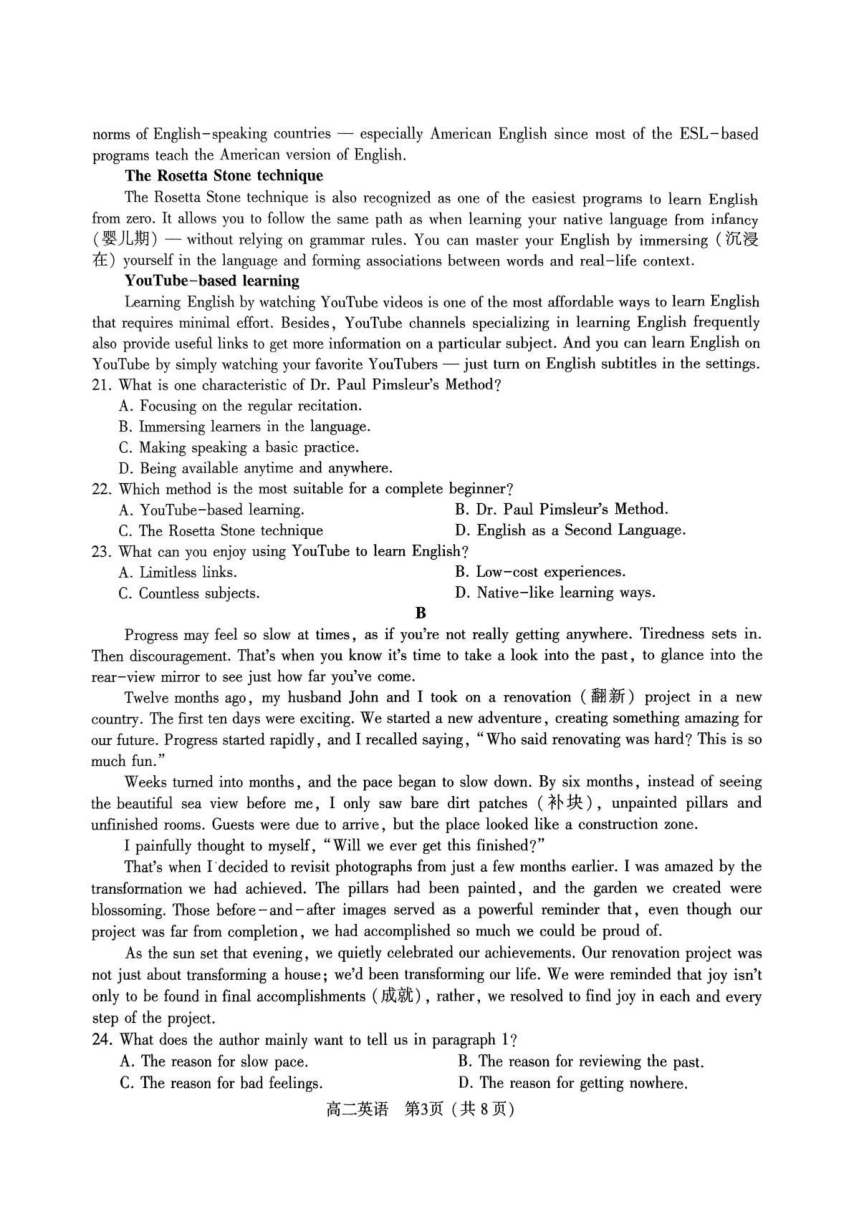
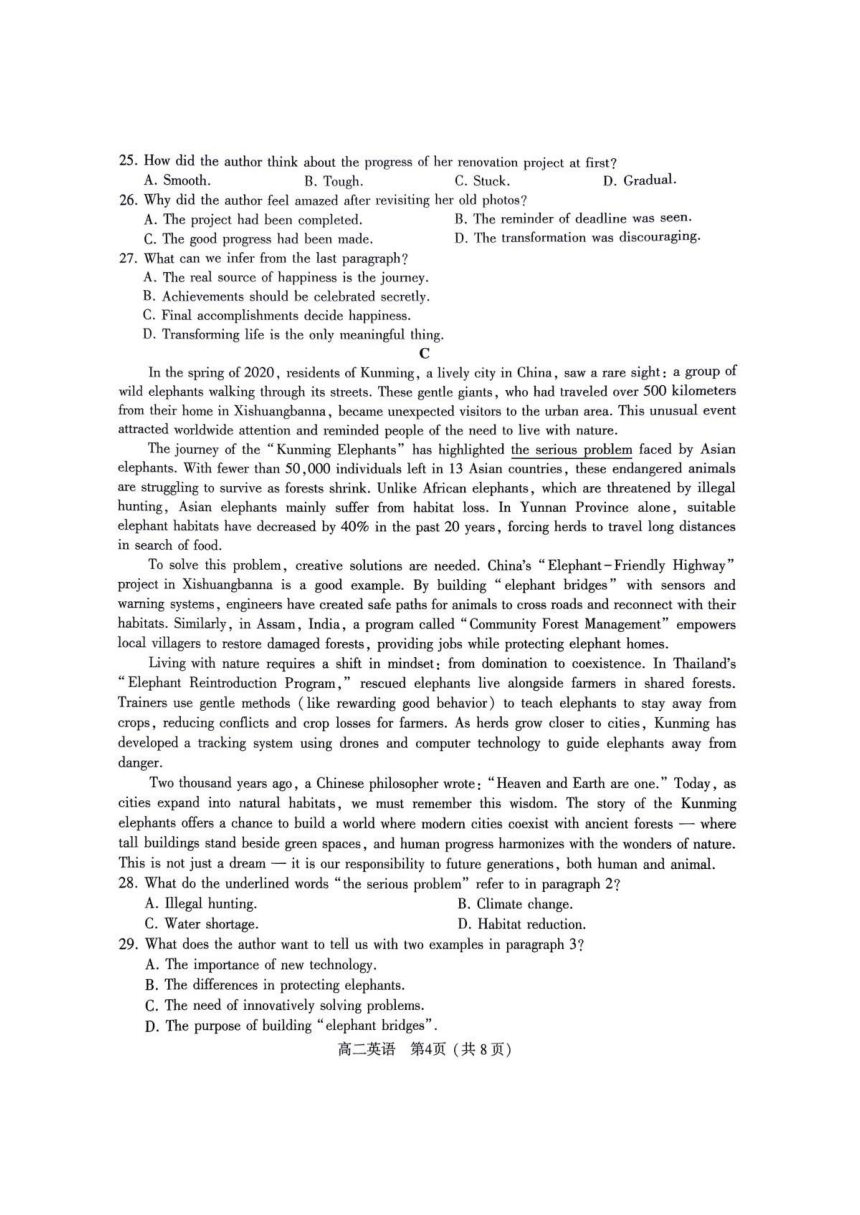
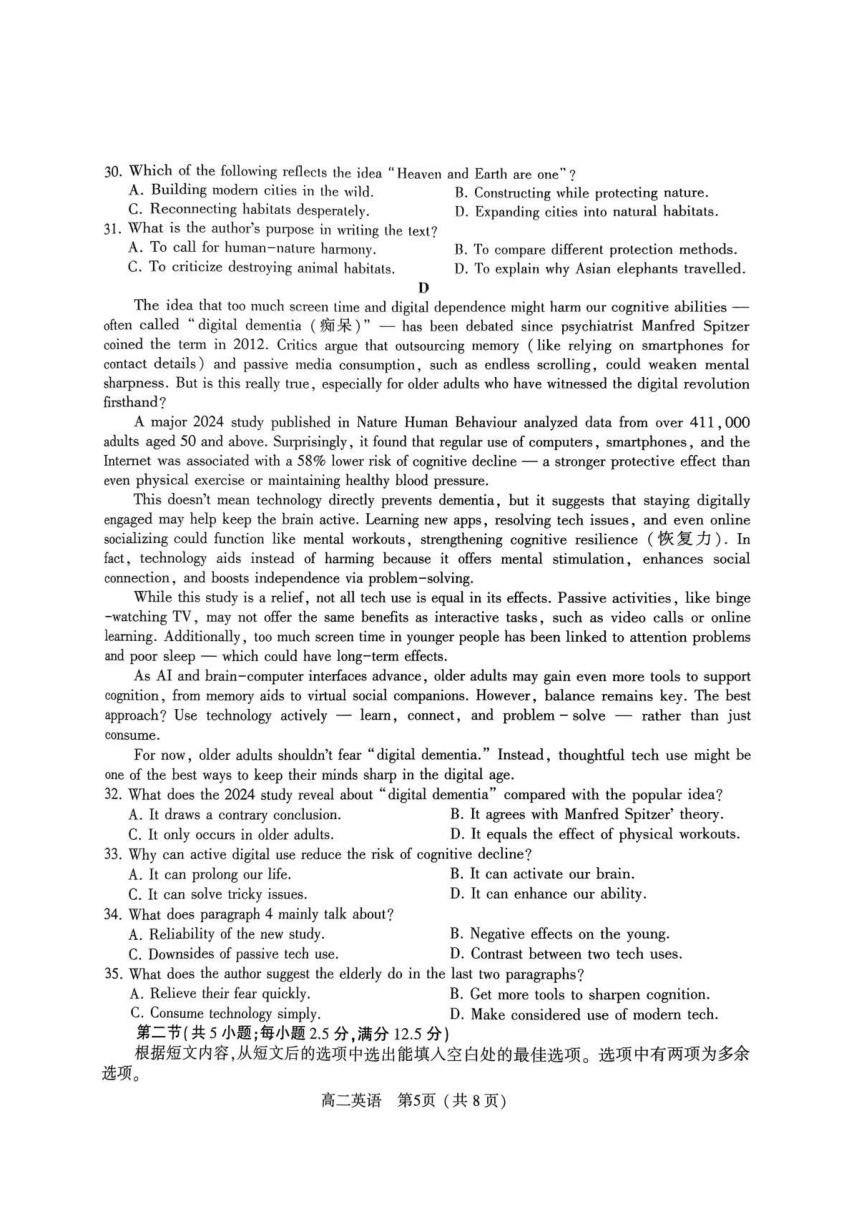
文档简介
30.Which of the following reflects the idea "Heaven and Earth are one"
A.Building modern cities in the wild.
B.Constructing while protecting nature.
C.Reconnecting habitats desperately.
D.Expanding cities into natural habitats.
31.What is the author's purpose in writing the text
A.To call for human-nature harmony.
B.To compare different protection methods.
C.To criticize destroying animal habitats.
D.To explain why Asian elephants travelled.
D
The idea that too much screen time and digital dependence might harm our cognitive abilities-
often called“digital dementia(呆)”一has been debated since psychiatrist Manfred Spitzer
coined the term in 2012.Critics argue that outsourcing memory (like relying on smartphones for
contact details)and passive media consumption,such as endless scrolling,could weaken mental
sharpness.But is this really true,especially for older adults who have witnessed the digital revolution
firsthand
A major 2024 study published in Nature Human Behaviour analyzed data from over 411,000
adults aged 50 and above.Surprisingly,it found that regular use of computers,smartphones,and the
Internet was associated with a 58%lower risk of cognitive decline-a stronger protective effect than
even physical exercise or maintaining healthy blood pressure.
This doesn't mean technology directly prevents dementia,but it suggests that staying digitally
engaged may help keep the brain active.Learning new apps,resolving tech issues,and even online
socializing could function like mental workouts,strengthening cognitive resilience ()In
fact,technology aids instead of harming because it offers mental stimulation,enhances social
connection,and boosts independence via problem-solving.
While this study is a relief,not all tech use is equal in its effects.Passive activities,like binge
-watching TV,may not offer the same benefits as interactive tasks,such as video calls or online
learning.Additionally,too much screen time in younger people has been linked to attention problems
and poor sleep-which could have long-term effects.
As AI and brain-computer interfaces advance,older adults may gain even more tools to support
cognition,from memory aids to virtual social companions.However,balance remains key.The best
approach Use technology actively -learn,connect,and problem-solve-rather than just
consume.
For now,older adults shouldn't fear "digital dementia."Instead,thoughtful tech use might be
one of the best ways to keep their minds sharp in the digital age.
32.What does the 2024 study reveal about "digital dementia"compared with the popular idea
A.It draws a contrary conclusion.
B.It agrees with Manfred Spitzer'theory.
C.It only occurs in older adults.
D.It equals the effect of physical workouts.
33.Why can active digital use reduce the risk of cognitive decline
A.It can prolong our life.
B.It can activate our brain.
C.It can solve tricky issues.
D.It can enhance our ability.
34.What does paragraph 4 mainly talk about
A.Reliability of the new study.
B.Negative effects on the young.
C.Downsides of passive tech use.
D.Contrast between two tech uses.
35.What does the author suggest the elderly do in the last two paragraphs
A.Relieve their fear quickly.
B.Get more tools to sharpen cognition.
C.Consume technology simply.
D.Make considered use of modern tech.
第二节(共5小题;每小题2.5分,满分12.5分)
根据短文内容,从短文后的选项中选出能填人空白处的最佳选项。选项中有两项为多余
选项。
高二英语第5页(共8页)
A.Building modern cities in the wild.
B.Constructing while protecting nature.
C.Reconnecting habitats desperately.
D.Expanding cities into natural habitats.
31.What is the author's purpose in writing the text
A.To call for human-nature harmony.
B.To compare different protection methods.
C.To criticize destroying animal habitats.
D.To explain why Asian elephants travelled.
D
The idea that too much screen time and digital dependence might harm our cognitive abilities-
often called“digital dementia(呆)”一has been debated since psychiatrist Manfred Spitzer
coined the term in 2012.Critics argue that outsourcing memory (like relying on smartphones for
contact details)and passive media consumption,such as endless scrolling,could weaken mental
sharpness.But is this really true,especially for older adults who have witnessed the digital revolution
firsthand
A major 2024 study published in Nature Human Behaviour analyzed data from over 411,000
adults aged 50 and above.Surprisingly,it found that regular use of computers,smartphones,and the
Internet was associated with a 58%lower risk of cognitive decline-a stronger protective effect than
even physical exercise or maintaining healthy blood pressure.
This doesn't mean technology directly prevents dementia,but it suggests that staying digitally
engaged may help keep the brain active.Learning new apps,resolving tech issues,and even online
socializing could function like mental workouts,strengthening cognitive resilience ()In
fact,technology aids instead of harming because it offers mental stimulation,enhances social
connection,and boosts independence via problem-solving.
While this study is a relief,not all tech use is equal in its effects.Passive activities,like binge
-watching TV,may not offer the same benefits as interactive tasks,such as video calls or online
learning.Additionally,too much screen time in younger people has been linked to attention problems
and poor sleep-which could have long-term effects.
As AI and brain-computer interfaces advance,older adults may gain even more tools to support
cognition,from memory aids to virtual social companions.However,balance remains key.The best
approach Use technology actively -learn,connect,and problem-solve-rather than just
consume.
For now,older adults shouldn't fear "digital dementia."Instead,thoughtful tech use might be
one of the best ways to keep their minds sharp in the digital age.
32.What does the 2024 study reveal about "digital dementia"compared with the popular idea
A.It draws a contrary conclusion.
B.It agrees with Manfred Spitzer'theory.
C.It only occurs in older adults.
D.It equals the effect of physical workouts.
33.Why can active digital use reduce the risk of cognitive decline
A.It can prolong our life.
B.It can activate our brain.
C.It can solve tricky issues.
D.It can enhance our ability.
34.What does paragraph 4 mainly talk about
A.Reliability of the new study.
B.Negative effects on the young.
C.Downsides of passive tech use.
D.Contrast between two tech uses.
35.What does the author suggest the elderly do in the last two paragraphs
A.Relieve their fear quickly.
B.Get more tools to sharpen cognition.
C.Consume technology simply.
D.Make considered use of modern tech.
第二节(共5小题;每小题2.5分,满分12.5分)
根据短文内容,从短文后的选项中选出能填人空白处的最佳选项。选项中有两项为多余
选项。
高二英语第5页(共8页)
同课章节目录
